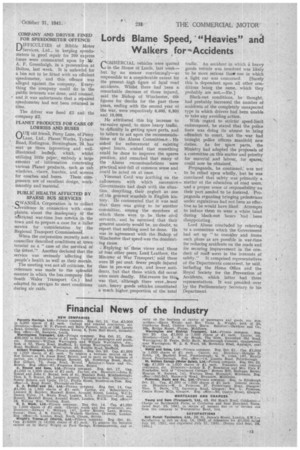Lords Blame Speed, '"Heavies" and Walkers for-Accidents
Page 17

If you've noticed an error in this article please click here to report it so we can fix it.
• r■OMMERCIAL vehicles were quoted L in the House of Lords, last week but. by no means convincingly-as responsible to a considerable extent for the present high figure of fatal road accidents. Whilst there had been a remarkable decrease of those injured, said the Bishop of Winchester, tee figures for deaths for the past three years, ending with the second year of the war, were respectively 6,600, 8,300 and 10,000. • He attributed this big increase to excessive speed, to more heavy traffic, to difficulty in getting spare parts, and to failure to act upon the recommendations of the Alness Committee.. He .asked for enforcement of existing speed limits, wished that something could be done to improve the spares position, and remarked that many of the Alness recommendations were practical and' full of common sense and
could be acted on at once. s Viscount Cecil was scathing on the callousness with which successive-,
Governments bad dealt with the situation, describing their neglect as one of. the greatest scandals in English his tory. He commented that it was said that there was going to be another 'committee, among the members of which there were to be three .civil servants,and he surmised that their greatest anxiety would be, no doubt, to report that nothing need be done. He was in agreement with the Bishop of Winchester that speed was the dominating cause. . Replying. tcrthese views and those of four. other peers, Lord Leathers, the Minister of War Transport: said there were 25 per cent, fewer people injured than in pre-was days, and fewer,accidents, but that those which did occur were more deadly. Hisi reason for thi1/2, was that, although there were „fewer cars, heavy goods vehicles constituted a much higher. proportion of the total traffic. An accident in which heavy goods vehicle was involved was likely to be more serious thaw one in which a light car was concerned. [Surely this is dependent upon all other conditions being the same, which they probably are not.-En.]
Black-out conditions, he thought, had probably increased the number of accidents of the completely unexpected type in which drivers had been unable to take any avoiding action.
With regard to stricter speed-limit enforcement, he stated that the police force was doing its utm,ost to bring &tendert to court, but the war had brought police officers manifold new duties. As for spare parts, the Ministry had adopted the proposals of a committee on this matter and priority for material' and labour, for spares, could now be obtained.
Propaganda, he continued: was not to be relied upon wholly, but he was convinced that safety was primarily a matter of the education of road users, and a proper sense of responsibility on their part needed to be fostered. Propaganda regarding bringing pedestrians tinder regulations had not been as effective as he would have liked. Attempts to induce them to wear a white band during black-out 'hours 'had been disappointing.
Lord Alness concluded by referring to a committee which the Government had set up "to conseer and frame such plans as are possible in war-time for reducing accidents on the roads and for securing improvement in the conduct of road users in the interests of safety." It comprised representatives of the Departments concerned, he said, including the Home Office and the Royal Society for the Prevention of Accidents, which latter had three representatives. It was presided over by the Parliamentary Secretary to his Department.




















































